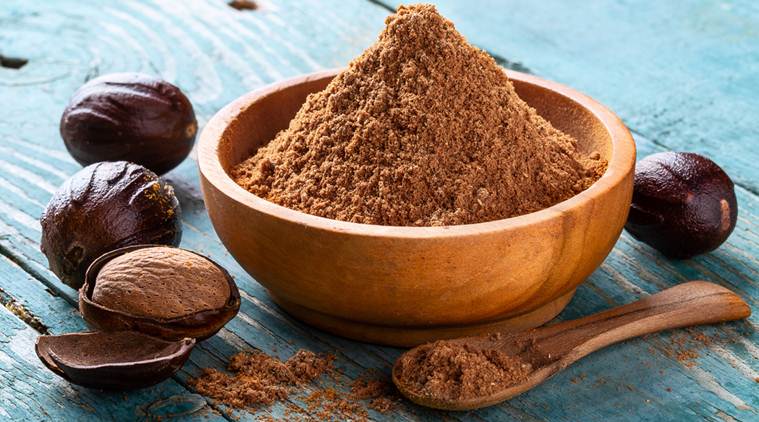When you think of nutmeg, your mind probably goes straight to the warm, comforting aroma of holiday baking. But did you know that this humble spice, derived from the seeds of the Myristica fragrans tree, may offer more than just flavor to your favorite dishes? In recent years, researchers have begun to uncover a host of potential health benefits associated with nutmeg, from anti-inflammatory effects to digestive support. In this article, we’ll explore the science behind these intriguing findings and learn how to safely incorporate nutmeg into a balanced wellness routine.
The Nutmeg Tree: A Tropical Treasure
Before we dive into the potential health benefits of nutmeg, let’s take a moment to appreciate the fascinating history and botanical properties of this unique spice. The nutmeg tree is native to the Banda Islands of Indonesia, also known as the “Spice Islands” for their rich history of spice cultivation and trade.
Despite its name, nutmeg is not actually a nut, but rather the seed kernel of the Myristica fragrans tree. This evergreen tree can grow up to 20 meters tall and produces fruits that split open when ripe, revealing a dark brown seed (nutmeg) covered in a bright red, lacy aril (mace). Both nutmeg and mace are prized for their distinctive flavor and aroma, which come from a complex mixture of essential oils and aromatic compounds.

Nutmeg has been used as a spice and medicine for thousands of years, with references to its trade and use dating back to ancient Roman and Arab civilizations. In medieval Europe, nutmeg was a highly coveted and expensive commodity, with some even believing it could ward off the plague. Today, while nutmeg is much more accessible and affordable, it remains an important crop and export for several countries, including Indonesia, Grenada, and Sri Lanka.
The Nutritional Profile of Nutmeg
Like many herbs and spices, nutmeg is low in calories and macronutrients but packed with an impressive array of micronutrients and bioactive compounds. A tablespoon of ground nutmeg (about 7 grams) contains:
- Manganese: 1.5 mg (73% of the Daily Value)
- Copper: 0.2 mg (22% of the DV)
- Magnesium: 17 mg (4% of the DV)
- Phosphorus: 8 mg (1% of the DV)
- Iron: 0.4 mg (2% of the DV)
- Potassium: 40 mg (1% of the DV)
- Calcium: 12 mg (1% of the DV)
Manganese is an essential mineral that plays a key role in bone formation, wound healing, and metabolism, while copper is important for red blood cell production, immune function, and collagen synthesis. Magnesium and phosphorus are crucial for energy production, muscle and nerve function, and bone health, while iron is necessary for oxygen transport and cellular respiration.
In addition to these minerals, nutmeg is also a good source of powerful antioxidants like cyanidins, phenolic compounds, and essential oils such as myristicin and elemicin. These compounds are thought to be responsible for many of the potential health benefits of nutmeg, which we’ll explore in more detail below.
Nutmeg’s Anti-Inflammatory Potential
One of the most promising areas of research on nutmeg’s health benefits involves its potential anti-inflammatory effects. Chronic inflammation is a key factor in many diseases, from arthritis and diabetes to heart disease and cancer. Some studies suggest that compounds in nutmeg may help to reduce inflammation and oxidative stress in the body.
For example, a 2016 animal study published in the Journal of Food and Drug Analysis found that nutmeg essential oil reduced inflammation and joint swelling in rats with arthritis. The researchers attributed these effects to the oil’s high content of sabinene, a compound with known anti-inflammatory properties.
Similarly, a 2012 in vitro study published in the journal Phytotherapy Research found that myristicin, another compound found in nutmeg, inhibited the production of inflammatory molecules like nitric oxide and interleukin-6 in activated macrophages (a type of white blood cell). The authors suggested that myristicin may have potential as a natural treatment for inflammatory diseases.

While these findings are certainly intriguing, it’s important to note that most of the research on nutmeg’s anti-inflammatory effects has been conducted in animal models or cell cultures. More human studies are needed to determine whether consuming nutmeg can have a significant impact on inflammation in the body over time.
Nutmeg for Digestive Health
Another traditional use of nutmeg that’s garnering attention from modern researchers is its potential to support digestive health. Nutmeg has long been used in folk medicine to treat a variety of digestive complaints, from nausea and vomiting to diarrhea and flatulence.
Some studies suggest that compounds in nutmeg may help to stimulate digestion by increasing the production of digestive enzymes and bile. For example, a 2002 animal study published in the journal Phytomedicine found that an extract of nutmeg increased the activity of lipase, an enzyme that breaks down fats, in the pancreas of rats. The extract also increased bile flow, which is important for the absorption of fats and fat-soluble vitamins.
Other research has focused on nutmeg’s potential to relieve gastrointestinal spasms and reduce the severity of diarrhea. A 2015 study published in the Journal of Ethnopharmacology found that an extract of nutmeg reduced diarrhea and abdominal pain in mice with castor oil-induced diarrhea. The extract also relaxed isolated guinea pig ileum (a portion of the small intestine), suggesting that it may have antispasmodic effects.
While these findings are promising, more research is needed to determine the optimal dosage and preparation of nutmeg for digestive health, as well as any potential side effects or interactions with medications. If you’re struggling with chronic digestive issues, it’s always best to consult with a healthcare provider before self-treating with nutmeg or any other herbal remedy.
Nutmeg and Brain Health
In addition to its potential benefits for inflammation and digestion, some preliminary research suggests that nutmeg may also have neuroprotective properties that could support brain health. For example, a 2016 study published in the journal Pharmaceutical Biology found that an extract of nutmeg improved memory and learning in mice with chemically induced amnesia. The extract also increased the levels of brain-derived neurotrophic factor (BDNF), a protein that plays a key role in the growth and survival of neurons.
Another study, published in the Journal of Medicinal Food in 2011, found that a nutmeg extract protected rat brain cells from oxidative stress and inflammation induced by beta-amyloid, a protein that accumulates in the brains of people with Alzheimer’s disease. The extract also improved the rats’ performance on a maze test, suggesting that it may have cognitive-enhancing effects.
While these findings are certainly intriguing, it’s important to keep in mind that they are based on animal studies and may not necessarily translate to humans. Additionally, the doses of nutmeg used in these studies were much higher than what you would typically consume in food. More research is needed to determine whether regular consumption of nutmeg in culinary amounts can have any meaningful impact on brain health over time.
The Potential Mood-Boosting Effects of Nutmeg
Another area of interest in nutmeg research involves its potential effects on mood and stress. Some studies suggest that compounds in nutmeg, particularly myristicin, may have mild psychoactive properties that could help to reduce anxiety and improve feelings of well-being.
For example, a 2011 animal study published in the Journal of Medicinal Plants Research found that an extract of nutmeg reduced anxiety-like behavior in mice subjected to an elevated plus maze test. The extract also increased the levels of serotonin and dopamine, two neurotransmitters involved in mood regulation, in the mice’s brains.
Similarly, a small human study published in the Journal of Herbal Pharmacotherapy in 2005 found that taking a nutmeg extract supplement for two weeks improved self-reported measures of anxiety and depression in a group of healthy volunteers. However, the study was very small (only 20 participants) and did not include a placebo control group, so more research is needed to confirm these findings.
It’s worth noting that while nutmeg may have some mild mood-boosting effects, it should not be used as a substitute for professional mental health treatment. If you are struggling with persistent anxiety, depression, or other mood disorders, it’s important to seek the guidance of a qualified healthcare provider.
How to Incorporate Nutmeg into Your Diet
If you’re interested in exploring the potential health benefits of nutmeg, there are many tasty and creative ways to incorporate this versatile spice into your diet. Here are a few ideas:
- Sprinkle ground nutmeg on oatmeal, yogurt, or smoothie bowls for a warm, spicy flavor.
- Add a pinch of nutmeg to savory dishes like roasted vegetables, soups, stews, and pasta sauces.
- Combine nutmeg with other warming spices like cinnamon, ginger, and cloves in baked goods like muffins, cookies, and pies.
- Stir a small amount of nutmeg into warm milk or plant-based milk for a soothing bedtime beverage.
- Grate fresh nutmeg over cocktails or mocktails for a unique and aromatic garnish.

When shopping for nutmeg, you can choose between whole nutmeg and pre-ground nutmeg. Whole nutmeg will retain its flavor and aroma longer, but requires a special grater or microplane to use. Pre-ground nutmeg is more convenient, but may lose potency more quickly. Whichever form you choose, be sure to store nutmeg in an airtight container in a cool, dry place to maintain its freshness.
Nutmeg Safety and Precautions
While nutmeg is generally considered safe when consumed in small amounts as a spice, it’s important to be aware of some potential risks and precautions. Nutmeg contains a compound called myristicin, which can be toxic in large doses. Consuming more than 10 grams of nutmeg (about 2-3 teaspoons) can cause symptoms like nausea, dizziness, hallucinations, and even seizures in some cases.
Additionally, some people may be allergic to nutmeg or other members of the Myristica genus. If you experience symptoms like hives, itching, swelling, or difficulty breathing after consuming nutmeg, seek medical attention immediately.
Nutmeg may also interact with certain medications, including blood thinners, anti-anxiety drugs, and antidepressants. If you are taking any medications or have a pre-existing health condition, it’s always best to consult with a healthcare provider before adding nutmeg to your diet in large amounts.
Pregnant women should also use caution with nutmeg, as some studies suggest that high doses may stimulate the uterus and increase the risk of miscarriage. While the small amounts typically used in cooking are likely safe, it’s best to consult with a healthcare provider before using nutmeg in medicinal amounts during pregnancy.
The Bottom Line
Nutmeg is a delicious and versatile spice with a long history of use in traditional medicine. While more research is needed to fully understand its potential health benefits, early studies suggest that nutmeg may have anti-inflammatory, digestive, neuroprotective, and mood-boosting properties.
However, it’s important to remember that nutmeg is not a magic bullet for health and should be used in moderation as part of an overall balanced diet and lifestyle. If you are interested in using nutmeg for medicinal purposes, it’s always best to consult with a qualified healthcare provider to ensure safety and appropriate dosing.
At the end of the day, nutmeg is a delightful spice that can add warmth, depth, and complexity to a wide variety of dishes. By incorporating it into your cooking in creative ways and enjoying it in moderation, you can reap the potential benefits of this fragrant and flavorful ingredient while savoring its rich culinary heritage.



